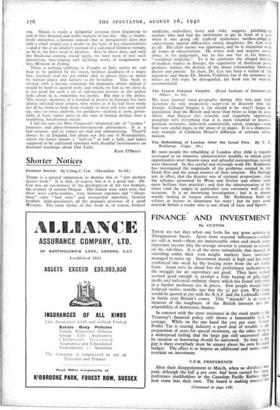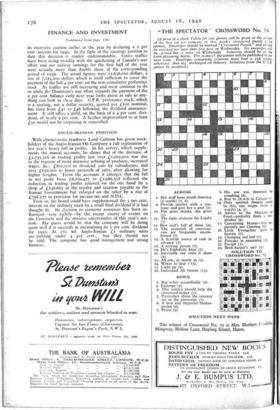FINANCE - AND INVESTMENT
By CUSTOS
THESE are not days when one looks for any great activity in Throgmorton Street. Apart from seasonal influences—which are still at work—there are innumerable other and much more important reasons why the average investor is content to remain on the side-lines. It is all the more remarkable that instead of subsiding under their own weight markets have somehow managed to move up. Investment morale is high and has been reinforced this week by the bracing news from the air battle front. Stern tests lie ahead but the preliminary indications in the struggle for air supremacy are good. They have indeed seemed good enough to prompt a little buying of gilt-edged stocks and industrial ordinary shares which has found reflection in a further moderate rise in prices. Few people would have believed twelve months ago that the 3-1- per cent. War Loan would be quoted at par with the R.A.F. and the Luftwaffe joined in battle over Britain's coasts. This " miracle" is at once a measure of the toughness of the British investor and the adaptability of democratic finance.
In contrast with the stout resistance in the stock markets the Treasury's financial policy still shows a lamentable lack of courage. While on the one hand the too' per cent. Excess Profits Tax is causing industry a good deal of trouble in the preparation of cases for special treatment, on the other there Is a widespread feeling that the large gap still uncovered either by taxation or borrowing should be narrowed. So long as the ,e gap is there everybody must be uneasy about his own financial budget. The effect is to impose an additional and unnecossarY restraint on investment.
C.P.R. PREFERENCE
After their disappointment in March, when no dividend was paid, although the full 4 per cent. had been earned for 1939, preference stockholders in the Canadian Pacific Railway have now come into their own. The board is making amends for (Continued on page 178)
FINANCE AND INVESTMENT
;Continued from page 176)
its excessive caution earlier in the year by declaring a 2 per cent. interim for 1940. In the light of the earnings position to date this decision is readily understandable. Gross traffics have been rising steadily with the quickening of Canada's war effort and net railway earnings for the first half of the year were actually more than double those of the corresponding period of 1939. The actual figures were 12,636,000 dollars, a rise of 7,285,000 dollars which is itself sufficient to cover the payment of the full 4 per cent. on the non-cumulative preference stock. As traffics are still increasing and must continue to do so while the Dominion's war effort expands the payment of the 2 per cent. balance early next year looks about as safe as any- thing can look in these days. C.P.R. preference stock, which is a sterling, not a dollar security, quoted per £1 00 nominal, has risen from £41 to £46 following the dividend announce- ment. It still offers a yield, on the basis of a 4 per cent. divi- dend, of nearly 9 per cent. A further improvement to at least i5o would not be surprising or unjustified.
ANGLO-IRANIAN POSITION
With characteristic frankness Lord Cadman has given stock- holders of the Anglo-Iranian Oil Company a full explanation of last year's heavy fall in profits. In his survey, which supple- ments the annual accounts, he shows that of the decrease of £2,735,316 in trading profits just over £1,000,000 was due to the expense of more intensive refining of products, increased wages, &c.; £800,000 to dividend cuts by subsidiaries; and over £650,000 to lower proceeds of sales, after allowing for higher freights. From the accounts it emerges that the fall in net profit from £6,109,477 to £2,986,358 reflected the reduction in trading profits relieved on the one hand by a drop of £536,665 in the royalty and taxation payable to the Iranian Government but enlarged on the other by a rise of £798,577 in provision for income-tax and N.D.C.
Even so, the board could have supplemented the 5 per cent. interim on the ordinary stock by a small final dividend if it had thought fit. Its decision to conserve resources has been in- fluenced-very rightly-by the recent course of events on the Continent and the obvious uncertainties of this year's out- look. My guess would be that the company will be doing quite well if it succeeds in maintaining its 5 per cent. dividend for 194o. At 27s. 6d. Anglo-Iranian LI ordinary units are yielding under 4 per cent., but they should not be sold. The company has good management and 'strong finances.



























 Previous page
Previous page